Items
Instructional Method is exactly
University of San Francisco
-
 2020
2020H396 University of San Francisco prompt
Prompt given to University of San Francisco students in H396, taught by Kathryn Nasstrom -
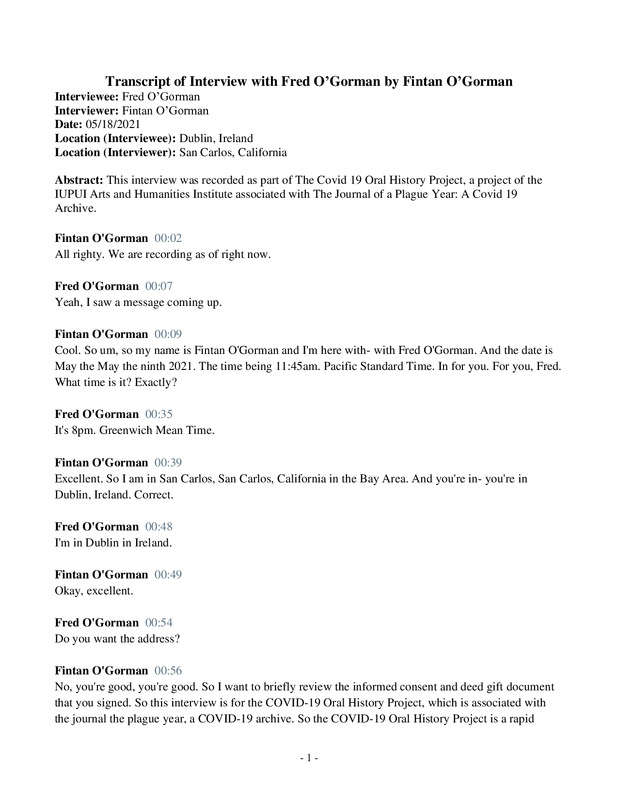 2021-05-09
2021-05-09Fred O'Gorman Oral History, 2021/05/09
Interview conducted by a nephew with uncle regarding the COVID response as it occured in the Republic of Ireland. Interviewee Fred O'Gorman discussed topics ranging from business closure and government response to personal and communal attitudes and behaviors in relation to pandemic in Ireland. The discussion also discussed ongoing vaccine rollout in Ireland and the dynamics of mental health through the course of the pandemic. -
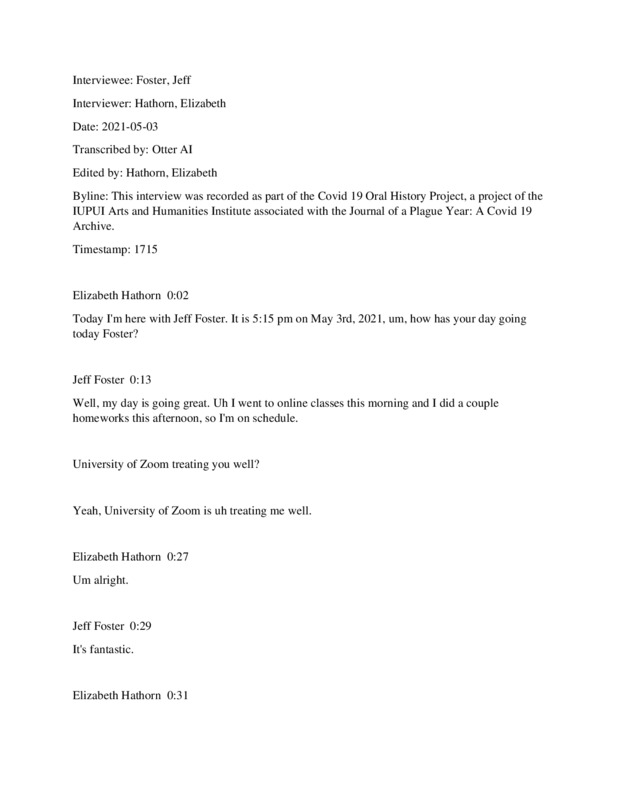 05/03/2021
05/03/2021Jeff Foster Oral History, 2021/05/03
Elizabeth Hathorn interviews Jeff Foster, a college student and member of the U.S. Army. He discusses the effects of COVDI-19 on college classes and on military training. He also touches on a few other aspects of life during the COVID-19 quarantine. -
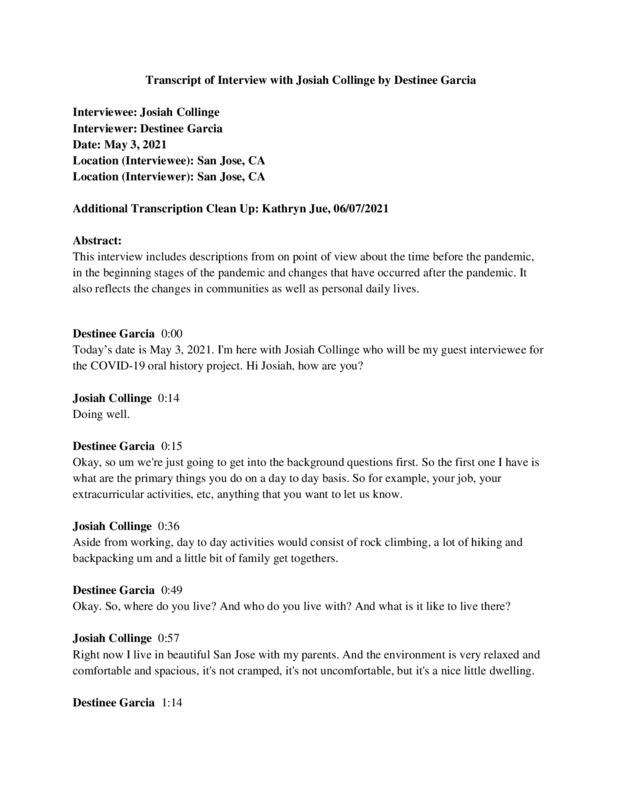 05/03/2021
05/03/2021Josiah Collinge Oral History, 2021/05/03
The interview describes the life of a young adult before the pandemic and how it changed during and after the pandemic. It also discusses the significance of the pandemic to him and those around him. -
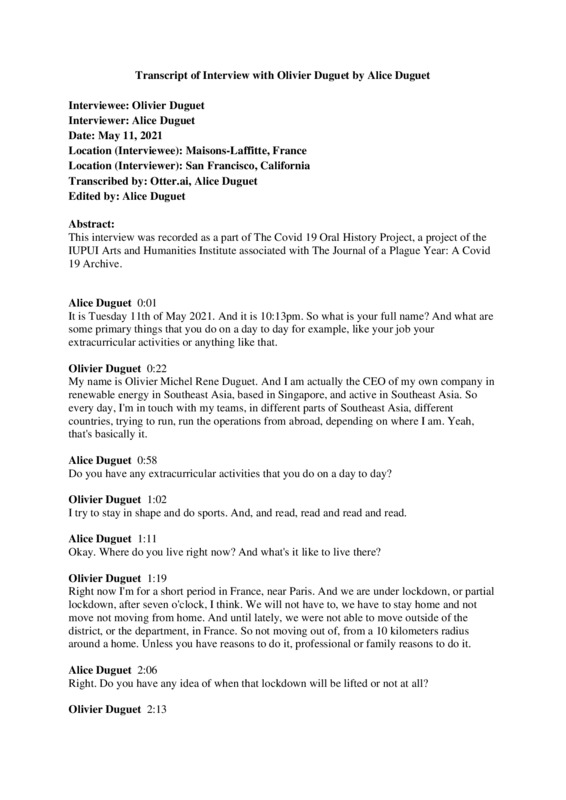 05/11/2021
05/11/2021Olivier Duguet Oral History, 2021/05/11
As a CEO in Southeast Asia, the interview covers topics such as travel bans, new ways to work in the office, vaccinations, and compares government decisions in Europe and certain countries in Asia. -
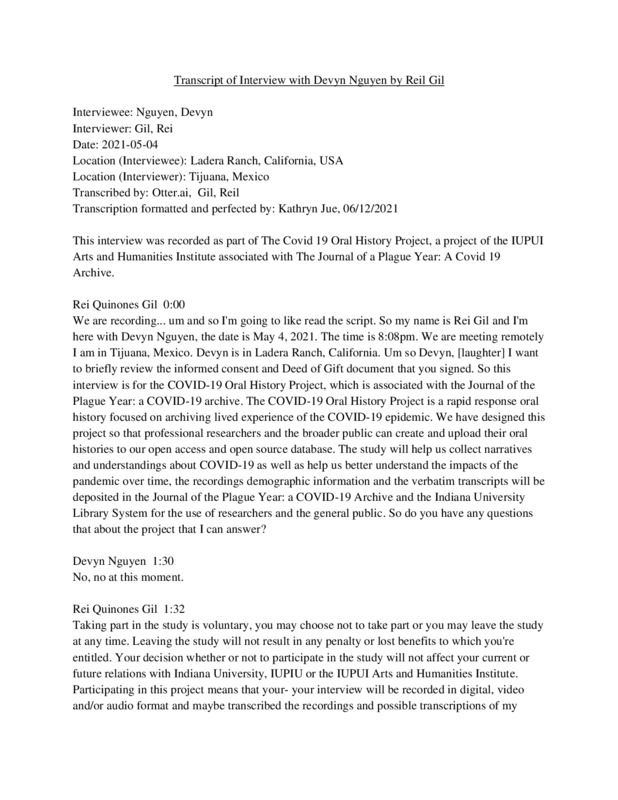 05/04/2021
05/04/2021Devyn Nguyen Oral History, 2021/05/04
Interviewee discussed what life is like graduating during the pandemic, working in a small family-owned business and the pushback against COVID safety in Orange County. She describes how the pandemic has brought her family together along with the tight-knit community with similar social values she has created. -
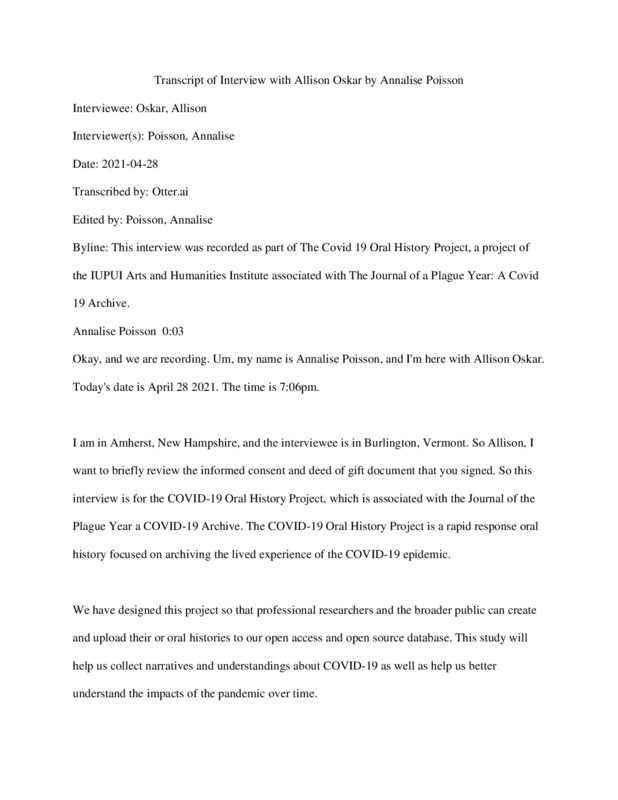 2021-04-28
2021-04-28Allison Oskar Oral History, 2021/04/28
This oral history focused on how smaller communities tackled the COVID-19 pandemic. The interview discusses how hospitals tackled the pandemic, and it goes into depth about what it was like to work for a hospital during this time. Also discussed were the ways in which the pandemic affected mental health and how it proved to be beneficial in some ways. There was a large focus on the ways in which COVID-19 affected the 'work life' balance of the interviewee. -
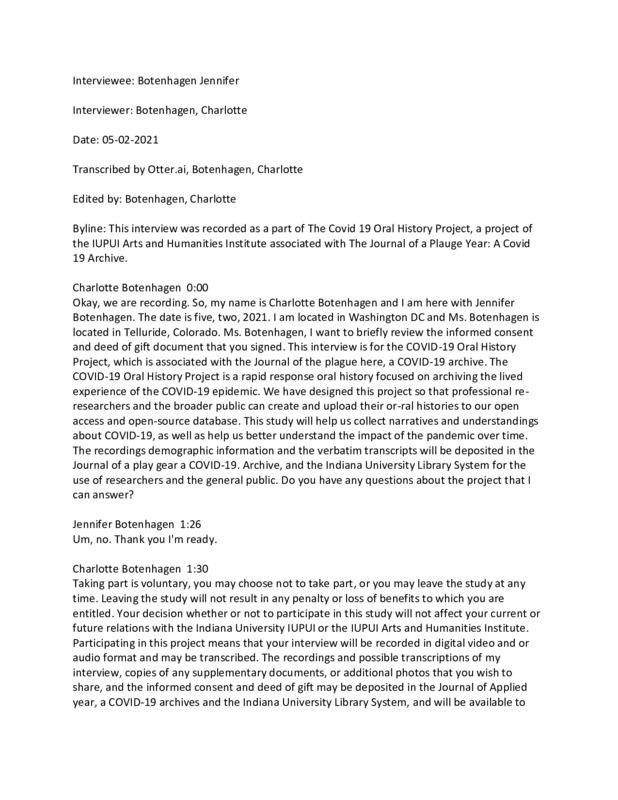 2021-05-02
2021-05-02Charlotte Botenhagen Oral History, 2021/05/02
This was an interview from Jennifer Botenhagen who is a preschool teacher living in a tiny mountain town. This interview details her experience adapting to teaching during the COVID-19 pandemic. -
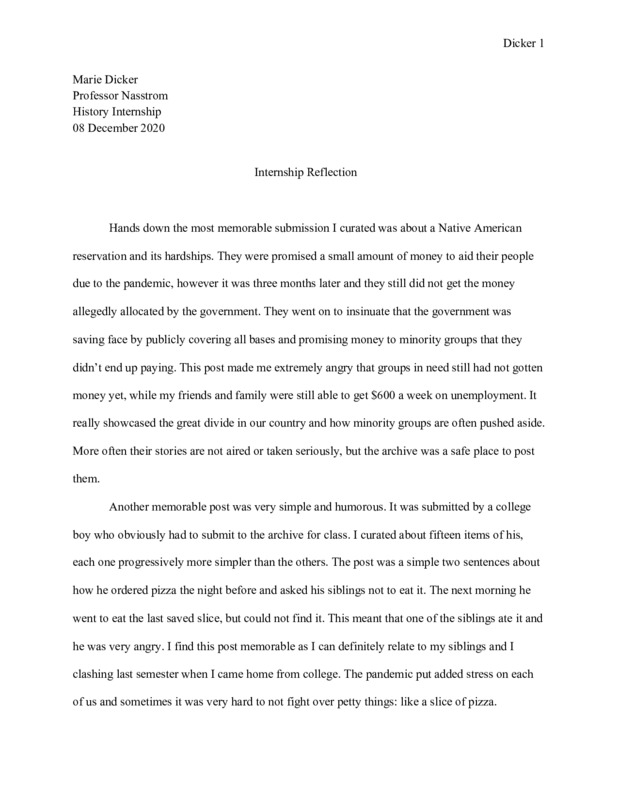 2020-12-08
2020-12-08Final Paper for H396
For the past five months, I have interned with A Journal of the Plague Year to help curate submissions from the year 2020. I have learned a lot about the collecting process and am excited to have been a part of such a great project! -
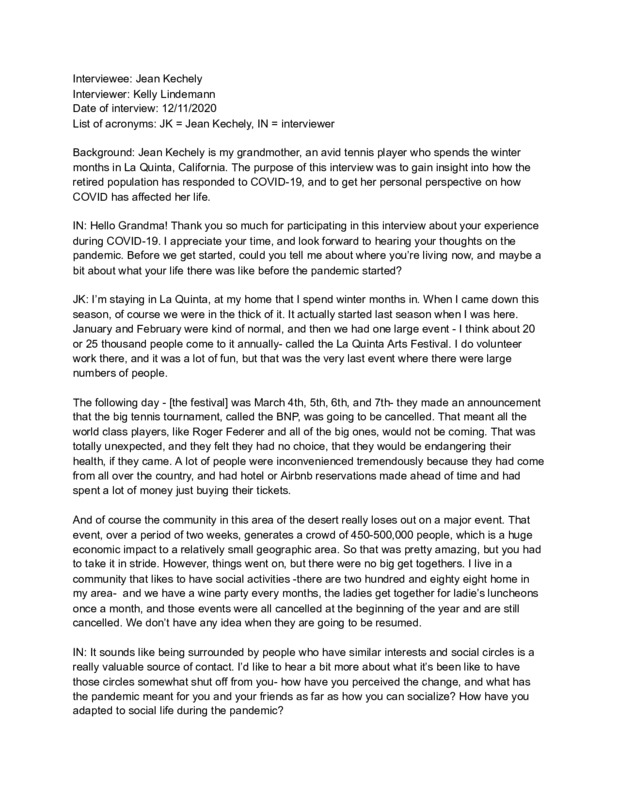 2020-12-11
2020-12-11Interview with Jean Kechely
Interviewee: Jean Kechely Interviewer: Kelly Lindemann Date of interview: 12/11/2020 List of acronyms: JK = Jean Kechely, IN = interviewer Background: Jean Kechely is my grandmother, an avid tennis player who spends the winter months in La Quinta, California. The purpose of this interview was to gain insight into how the retired population has responded to COVID-19, and to get her personal perspective on how COVID has affected her life. IN: Hello Grandma! Thank you so much for participating in this interview about your experience during COVID-19. I appreciate your time, and look forward to hearing your thoughts on the pandemic. Before we get started, could you tell me about where you’re living now, and maybe a bit about what your life there was like before the pandemic started? JK: I’m staying in La Quinta, at my home that I spend winter months in. When I came down this season, of course we were in the thick of it. It actually started last season when I was here. January and February were kind of normal, and then we had one large event - I think about 20 or 25 thousand people come to it annually- called the La Quinta Arts Festival. I do volunteer work there, and it was a lot of fun, but that was the very last event where there were large numbers of people. The following day - [the festival] was March 4th, 5th, 6th, and 7th- they made an announcement that the big tennis tournament, called the BNP, was going to be cancelled. That meant all the world class players, like Roger Federer and all of the big ones, would not be coming. That was totally unexpected, and they felt they had no choice, that they would be endangering their health, if they came. A lot of people were inconvenienced tremendously because they had come from all over the country, and had hotel or Airbnb reservations made ahead of time and had spent a lot of money just buying their tickets. And of course the community in this area of the desert really loses out on a major event. That event, over a period of two weeks, generates a crowd of 450-500,000 people, which is a huge economic impact to a relatively small geographic area. So that was pretty amazing, but you had to take it in stride. However, things went on, but there were no big get togethers. I live in a community that likes to have social activities -there are two hundred and eighty eight home in my area- and we have a wine party every months, the ladies get together for ladie’s luncheons once a month, and those events were all cancelled at the beginning of the year and are still cancelled. We don’t have any idea when they are going to be resumed. IN: It sounds like being surrounded by people who have similar interests and social circles is a really valuable source of contact. I’d like to hear a bit more about what it’s been like to have those circles somewhat shut off from you- how have you perceived the change, and what has the pandemic meant for you and your friends as far as how you can socialize? How have you adapted to social life during the pandemic? JK: Well actually, I would have to tell you that I feel very minimally impacted due to being a retired person and in excellent help, which enables me to engage in the normal activities that I enjoy, which I would describe as healthful recreation. I still play tennis three times a week, and my tennis club had to make a couple of changes. They require all of us members to wear a mask when we enter the property, but once we’re on the court and actually playing then we can remove our masks. Another big change was that we could not invite any guests to the club; that was something that we all enjoyed doing, but they felt that they couldn’t allow that. So, that’s how it still is right now. IN: As far as your companions in the club, are you all fairly like minded in your reactions, or are there differences in people’s opinion on how to respond to the virus? JK: Oh, there are many, many differences. Some people feel that they just don’t know what to believe about it. They don’t know what advice to follow, so anything that is actually mandated by the government, then we have to follow that to be good citizens. Several of the women with whom I play would have an adult child tell them “Well Mom, I don’t think you should be playing any longer because you have no control over where those people are going, or with whom they’re associating”. So, I’ve had a couple of players that I know stop playing, though now they’re back. There are a lot of people from Canada who are members of my tennis club. As soon as this started happening, I’d say around February, they left quickly to return to Canada because they were afraid that the borders would be closed down. This year almose none of them have come back, and the composition of our membership is greatly reduced and very changed. There is one Canadian couple who did fly down, quarantined for two weeks and had their car shipped down, which they’d never done before. Around here, a lot of the women are middle aged, fifty or older, and I am considerably older. Some of them didn’t even feel comfortable visiting each other’s homes, but some were so bored and needed socialization since they couldn’t do their regular activities that they were willing to go to somebody else’s house here in the neighborhood. I have a couple of friends who come over once a week to play Rummikub or Scrabble. One of my good friends has been volunteering for eleven years as an usher for the McCallum Theatre. They get top entertainment for very short runs, maybe only a weekend or an evening, but they have top entertainers like Rhonda Fleming, for example. She is dreadfully missing the wonderful entertainment that she got to see, and misses the people with whom she used to work as an usher. There’s still no idea of when they will be able to resume, since entertainment contracts like those are created at least a year ahead of time. That’s been a big loss for her to not have that. She’s someone who comes over and plays Rummikub or Scrabble with me. IN: It seems quite valuable to have a close circle of friends that you can get together with. Our social lives are very important and have a significant impact on our mental health. JK: And especially as you get older, they say that socialization is very important to help maintain your psychological health. I feel very fortunate that I can do this, and am very happy that there are some women in the area willing to go out and go to somebody else’s house. But I know there are a few who still don’t feel comfortable leaving their own homes, and it must be very difficult to them. IN: I’m interested in your perspective on the relative levels of safety and comfort that people have around protecting themselves from the virus. From what I’ve heard, the virus is more dangerous to people who are immunocompromised or older. I’ve seen a few submissions to the Journal of the Plague Year that center around older people who have a lot of apprehension of the virus, and many of them have taken drastic measures to protect themselves. As someone who is older, do you consider yourself to be vulnerable to COVID, and what is your attitude towards the virus? JK: Well age-wise of course I am vulnerable, but fortunately I do not have any underlying immune problems and am grateful for having such good health. I realize how difficult this pandemic has been for so many American families- parents are trying to keep an income stream, many of them have school-aged children at home and have to supervise their schoolwork, and try to keep the family engaged in outdoor activities. It’s almost too much to expect of a great many families, especially when it’s gone on since February or March and accompanied by harsh lockdown measures. A lot of people that I talk to are not certain that the advice they were given at the beginning [of the pandemic] has been accurate. They feel that a lot of the advice handed down by government bodies has been inaccurate. But you can’t blame them, since this is the first time such a thing has happened in our lifetimes, and everybody is having to go carefully and listen to what is advised. If you are a responsible person you listen to the advice, since these are the people who are in the NHI and the CDC and we should listen to what they think is best. A lot of people say, “We’ve been misled and don’t know what to believe”. I think with the mask thing there’s been a lot of resistance, and of course when you have your president so often appearing in public without his mask, that sends a poor message. I think that wearing a mask is a very small thing to ask of a person, whether it’s going to help other people or yourself- it’s such an easy thing and we should all be willing to do it. IN: I think so too, and on that note would like to bring up how the virus has been politicized, especially as it’s occurred during an election year, and how our governmental bodies have taken strategic stances on it. If you recall, back in March there were conflicting news articles about the subject of wearing a mask- some of then claimed that wearing one would increase your chances of getting it, or make it harder for medical workers to get the masks they needed. There was so much conflicting advice in the news, and I think that really impacted people’s perception of the virus and made it much harder to for them to know how to respond. Living in a community where people are from different areas and backgrounds must have given you an interesting view into the different ways that people perceive the virus. JK: I do hope that we can have this vaccine soon, but even with that there are many people who say that they won’t get the vaccine until its proven to be safe and effective. And I do understand that, but am glad that it will be made available first to healthcare workers and elderly people in nursing homes. IN: On that topic, some of the stories coming from nursing homes are heartbreaking, especially since they’ve had to be strict about limiting visitors. Living in isolation is hard for anyone, but living in a community away from your friends and family must make it a level of magnitude more difficult. JK: Oh yes. I have one of my friends whose husband is- was- in an Alzheimer’s care facility, and she would visit him every Tuesday and Thursday for over a year. When COVID-19 hit, the facility would not allow any visitors, even family. That was very hard for her, but they were able to arrange telephone and Zoom visits so she could actually see him. He passed away before I was abel to come down for the season, and I was very, very saddened for her. IN: The amount of suffering that people have had to endure is astonishing, and I hope that having a record of people’s experiences during the pandemic can help us to remember what people went through and maybe help us do better in the future. I sincerely appreciate that you’ve participated in this interview to share with the Journal of the Plague Year, and thank you so much for having this conversation with me. -
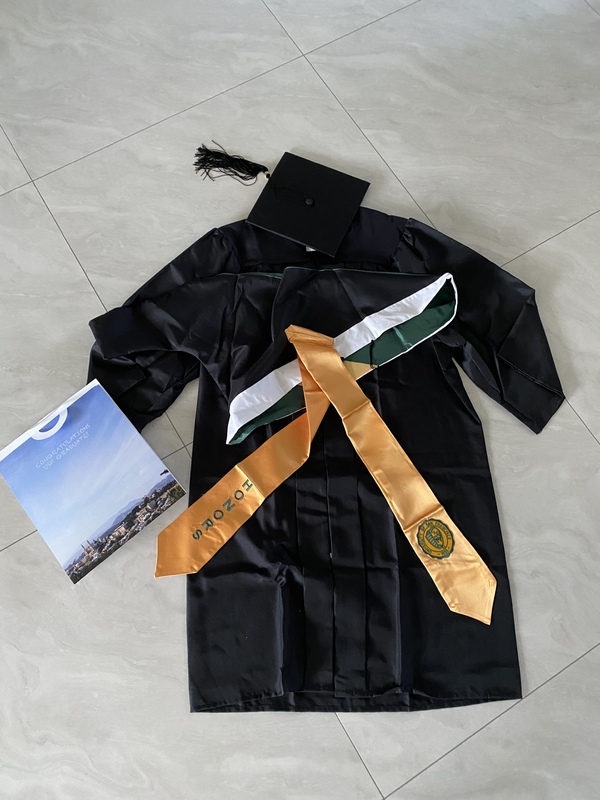 2020-12-01
2020-12-01Graduation pack
Since the graduation has been canceled due to COVID-19, the graduation package had to be shipped to students and let us keep it until it is safe to hold the actual ceremony on campus. I received mine on Dec. 1st, the ceremony was supposed to be hold on Dec. 12 online. I don’t know if the ceremony will be hold in the near future, but I believe that it won’t be what we’ve imagined it. I won’t be able to see all my friends together again, some of us graduated and went to other countries because of the unfriendly policy to international students, and I don’t even know if I will ever see them again. -
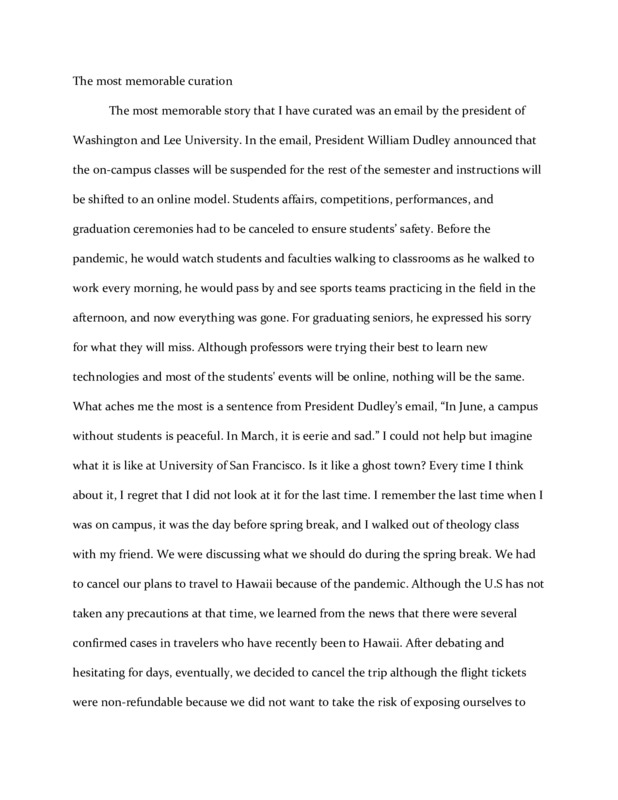 2020-12-10
2020-12-10The most memorable curation
The most memorable story that I have curated was an email by the president of Washington and Lee University. In the email, President William Dudley announced that the on-campus classes will be suspended for the rest of the semester and instructions will be shifted to an online model. Students affairs, competitions, performances, and graduation ceremonies had to be canceled to ensure students’ safety. Before the pandemic, he would watch students and faculties walking to classrooms as he walked to work every morning, he would pass by and see sports teams practicing in the field in the afternoon, and now everything was gone. For graduating seniors, he expressed his sorry for what they will miss. Although professors were trying their best to learn new technologies and most of the students' events will be online, nothing will be the same. What aches me the most is a sentence from President Dudley’s email, “In June, a campus without students is peaceful. In March, it is eerie and sad.” I could not help but imagine what it is like at University of San Francisco. Is it like a ghost town? Every time I think about it, I regret that I did not look at it for the last time. I remember the last time when I was on campus, it was the day before spring break, and I walked out of theology class with my friend. We were discussing what we should do during the spring break. We had to cancel our plans to travel to Hawaii because of the pandemic. Although the U.S has not taken any precautions at that time, we learned from the news that there were several confirmed cases in travelers who have recently been to Hawaii. After debating and hesitating for days, eventually, we decided to cancel the trip although the flight tickets were non-refundable because we did not want to take the risk of exposing ourselves to the virus. Every Chinese student I knew made the same decision. What happened to our home country made us realize how harmful this virus could be. On the way walking out of the campus, I was texting and discussing should we stock some disinfectant and stay at home for the whole spring break with my friend, I could never imagine that it was the last time I walked on campus and saw USF. It hurts my heart when I try to remember what it was like to walk on campus, how the St. Ignatius Church would shine under the sunset; I hate myself for not looking at everything for the one last time because I was busy texting. Shortly, USF announced online classes for the rest of the semester and I returned to China within weeks. When the fall 2020 semester was announced to be online, I first made the decision to take a gap semester because I want to spend my last semester with friends, and most importantly, to celebrate the graduation ceremony with my friends and family on campus. However, with the U.S. government putting visa restrictions on Chinese and the conflict between the U.S and China getting more serious, I began to fear that if I do not complete my degree now, there could be a possibility that I never would. Yesterday, I finished my last class in college life and my virtual graduation ceremony is only days away. I envy those seniors who graduated before me, they had a chance to celebrate with families and friends, they had a chance to say goodbye to their college life; I envy those who will graduate in the following years, they will have the chance to celebrate their graduation ceremony on campus. Everything that has ever happened in the past months seems like a dream. Only if I know how to end this dream. -
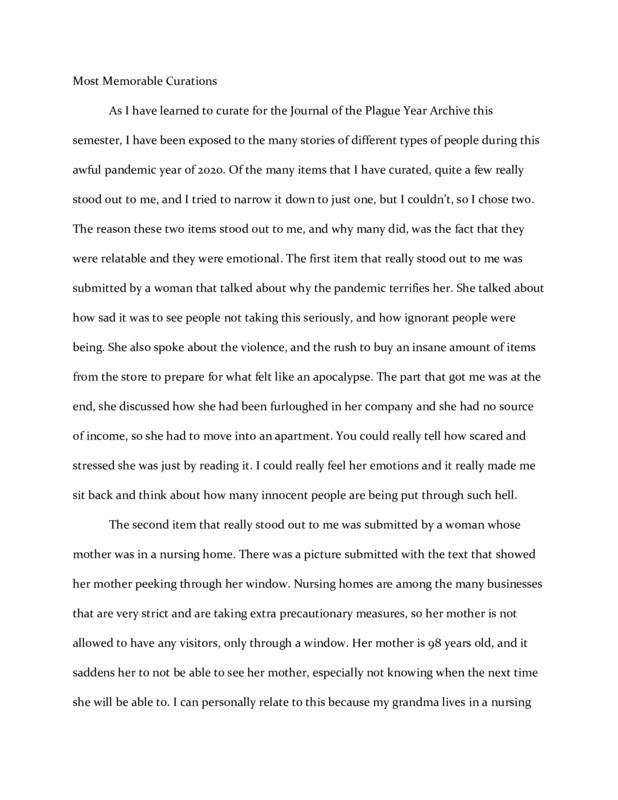 2020-12-08
2020-12-08Most Memorable Curations
As I have learned to curate for the Journal of the Plague Year Archive this semester, I have been exposed to the many stories of different types of people during this awful pandemic year of 2020. Of the many items that I have curated, quite a few really stood out to me, and I tried to narrow it down to just one, but I couldn’t, so I chose two. The reason these two items stood out to me, and why many did, was the fact that they were relatable and they were emotional. The first item that really stood out to me was submitted by a woman that talked about why the pandemic terrifies her. She talked about how sad it was to see people not taking this seriously, and how ignorant people were being. She also spoke about the violence, and the rush to buy an insane amount of items from the store to prepare for what felt like an apocalypse. The part that got me was at the end, she discussed how she had been furloughed in her company and she had no source of income, so she had to move into an apartment. You could really tell how scared and stressed she was just by reading it. I could really feel her emotions and it really made me sit back and think about how many innocent people are being put through such hell. The second item that really stood out to me was submitted by a woman whose mother was in a nursing home. There was a picture submitted with the text that showed her mother peeking through her window. Nursing homes are among the many businesses that are very strict and are taking extra precautionary measures, so her mother is not allowed to have any visitors, only through a window. Her mother is 98 years old, and it saddens her to not be able to see her mother, especially not knowing when the next time she will be able to. I can personally relate to this because my grandma lives in a nursing home back in my hometown of Lewiston, ID. It is hard enough to live so far away and not be able to see her, but now I am not even allowed to see her when I visit home. It has been a hard year for my family because my grandma has dementia, and not being able to visit her cuts even deeper. My mother has especially had a rough year, because she has to sit and wait to see her mom, not knowing when that will be. -
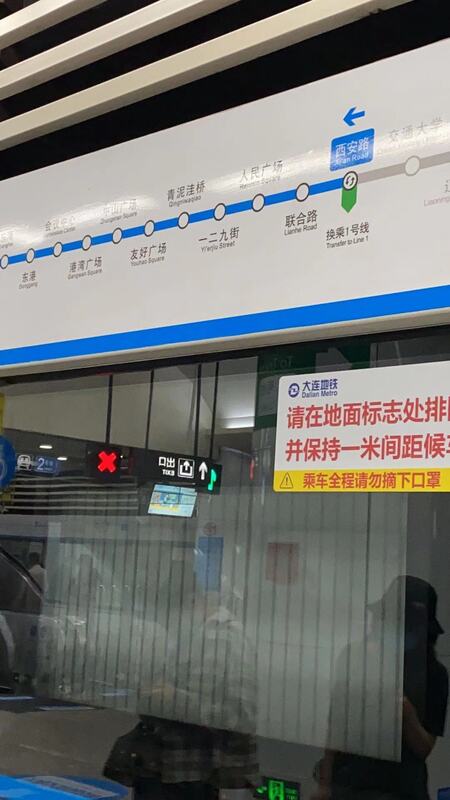 2020-12-03
2020-12-03Metro with warning signs
The metro post signs warning that a social distance of 1 meter must be kept and a face mask must be worn all-time in the metro. -
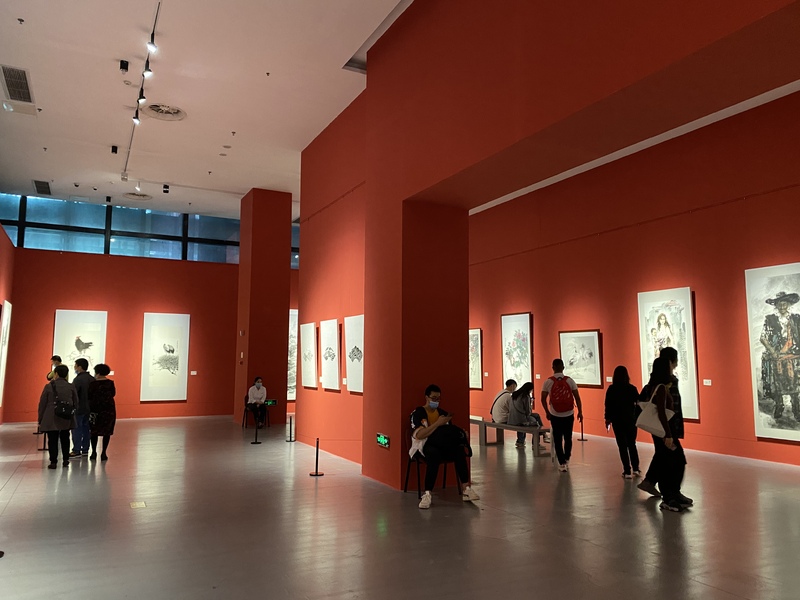 2020-10-03
2020-10-03Art gallery in ChongQing
This is ChongQing Art Gallery. It was re-opened to the public in summer and everyone must obey the mandatory mask rules and pass the temperature test at the entrance. No food or drink are allowed in the gallery to prevent people taking their masks off. -
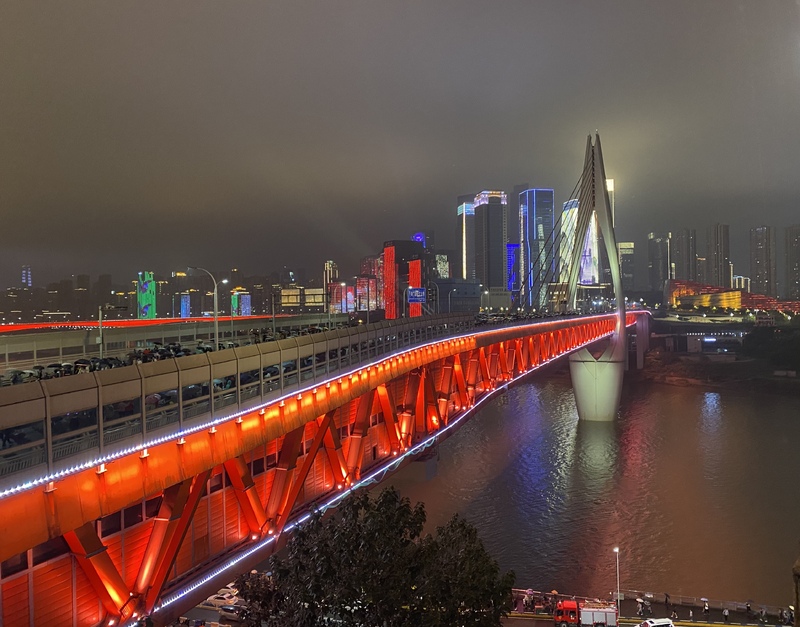 2020-10-03
2020-10-03ChongQing on National Day
The National Day is the longest holiday in China, and usually, everyone likes to take the opportunity to go out and take a tour to another city. After months of quarantine and lockdown, the data showed that people were desperate to take some fresh air and the volume of travelers reached 5 hundred million this year. This is a photo of the QianSiMen Bridge in the city of ChongQing, it was under lockdown and forbid cars to pass through so travelers could take a walk on the bridge and see the Cityview at night. The bridge was full of people and the policies only allowed one-way on each side of the bridge to control the flow and avoid chaos. -
2020-03-29
Start of 14 days of quarantine
Since March 2020, the Chinese government requires a mandatory 14-day quarantine in hotels for everyone who enters the country to ensure no cases from aboard will cause transmission within the country. This is the confirmation letter that I received after I was placed in the quarantine hotel, it indicates the date and time of my entry and the time of the end of quarantine. -
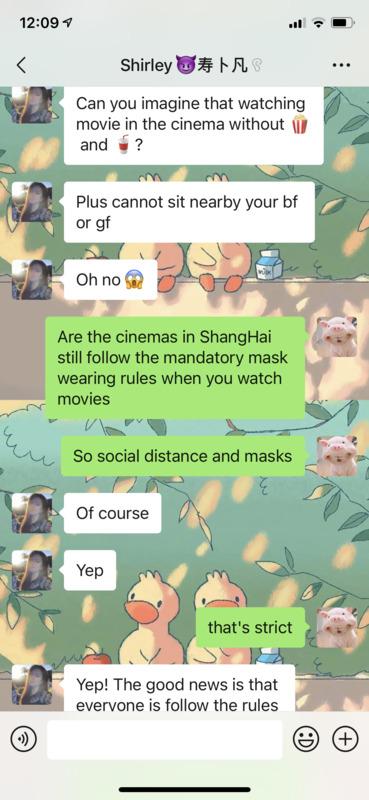 2020-11-10
2020-11-10Cinemas in Shanghai
For months the cinemas have been closed due to the pandemic. They were allowed to re-open starting from July, and here's a friend talking about what's like to watch a movie in Shanghai, China. -
 2020-11-10
2020-11-10Zenly recorded how many days without friends
In March, our school announced remote teaching for the rest of the semester during the spring break. I was playing video games with my friends when the announcement came out and none of us could imagine it was the last time we will be in the same room. Immediately we started to plan on going back to home to China, we did not even say goodbye that night because we thought we were going to meet next semester or some time earlier. So we packed our things and left in rush, booked the earliest flight and tried to get home before the travel ban got stricter. Since then, Zenly recorded it's been 234 days that we haven't met each other. I miss the old days. -
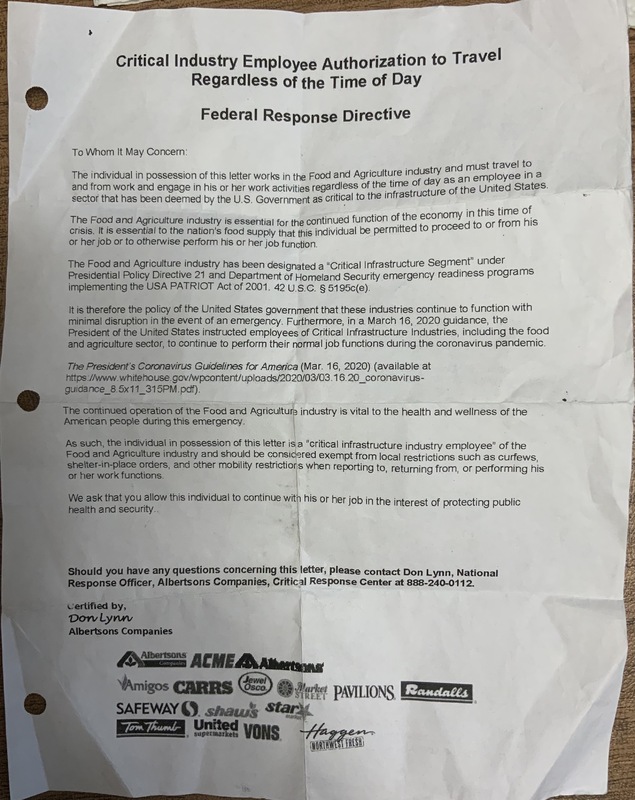 2020-05
2020-05Critical Industry Employee Authorization to Travel Regardless of the Time of Day
When this ongoing pandemic initially began, people were not sure how long the extremities would last or whether COVID-19 was as bad as some people claimed it to be. As we now know, the wearing of the mask has become politicized with some movements and ideologies, and the safety and wellbeing of the community is being contested with freedom, pandemic conspiracies and/or blatant denial. It is now November 6, 2020, and I can safely say we as a global community have seen ridiculous and ineffable events unravel over the past year. Sadly, these unique occurrences are far from ending as the pandemic is worsening in terms of case spikes and as the people are growing ever more weary. I am reflecting during this election period, looking back at the strange changes I haven't seen before in my life, and recently I found this work document I had at home. The document presented is a paper granting the holder the right to go about their day, allowing them to travel when others were not allowed.This paper was given to me at work during May 2020 just a curfew took place. Although the mandated curfew in San Francisco only lasted about a week, I remember that people did take it seriously more or less as I walked to work barely seeing anyone outside. The paper would help me if the police stopped me at any point. My parents were worried that I would get pulled over since I worked evening shifts (luckily I didn't have this happen). What is interesting and scary about this document was that others could have been fined or got into trouble if they were stopped; this was something I never considered at that time. Others may state that this document is scary in terms of historical precedence to the nineteenth century in America. This can be tied to freedom papers in segregated and/or slave based areas in the American south when African Americans had to possess such papers stating their business either on their or someone else's behalf. The repercussions otherwise could have been horribly severe if they didn't have said papers. Thus, this paper holds power and grants amnesty from punishment. Two different periods with different purposes but similar implications and deterrents. Interesting what can be created during a modern pandemic. -
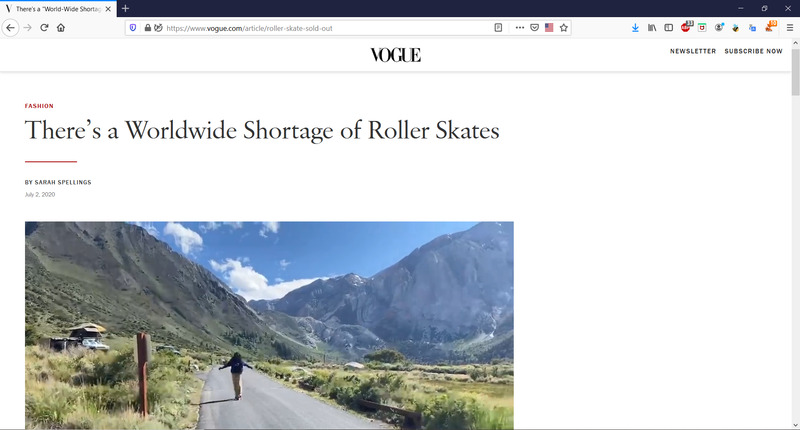 2020-07-02
2020-07-02World-Wide Roller Skate Shortage
Roller-skating has recently become a viral trend, to the point that major skate companies have been sold out for weeks. While the hobby has been alive and well within Black and skate communities, it has had a massive resurgence in popularity in the mainstream. -
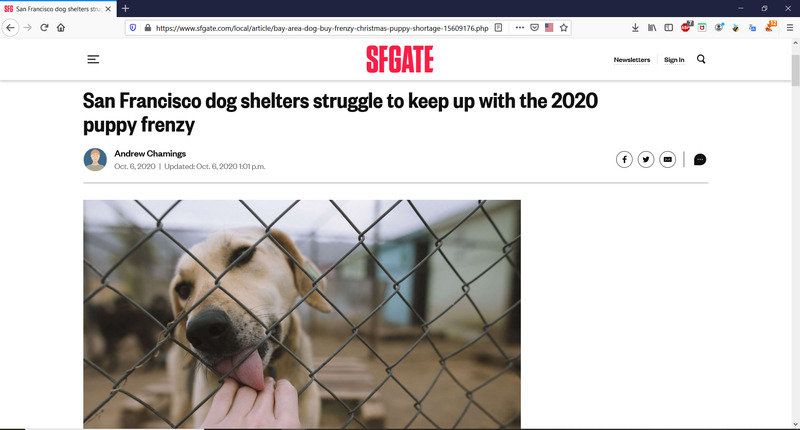 2020-10-06
2020-10-06Pet shortage in SF
The COVID-19 lockdown has forced many people into social isolation, and also provided the free time necessary to care for and train new pets. The resulting surge in dog adoptions has led to a shortage of adoptable animals in San Francisco shelters, and the pet sales industry made a record-breaking $100 billion this year. Since puppies can no longer be commercially shipped, a company called PuppySpot has taken to chartering private jets to transport animals bred in the Midwest to the Bay Area. With no end to the pandemic in site, demand has continued to rise. -
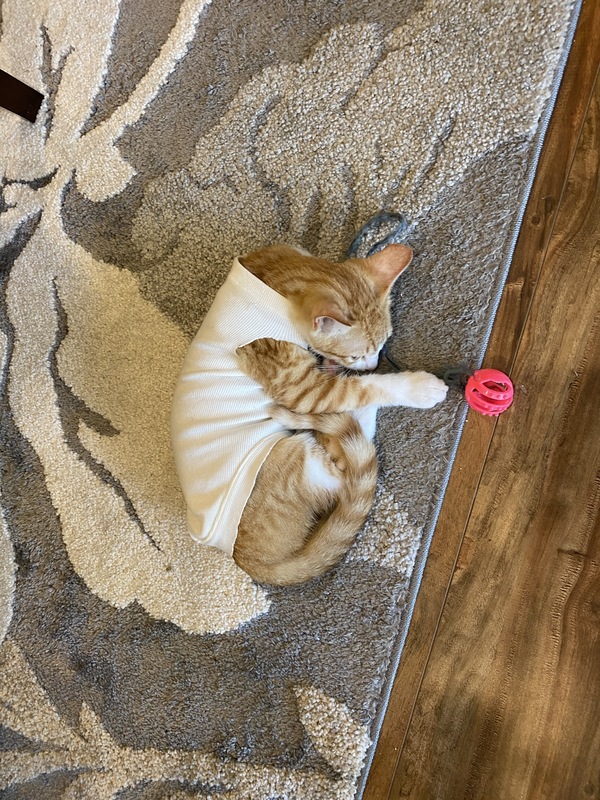 2020-06-10
2020-06-10Pets and their effect during the pandemic
During the pandemic, to help deal with the new stresses my family decided to adopt a cat from a family friend. This animal actually helped to relieve some of the newfound issues that quarantine has brought on (fear, loneliness, etc.) . I feel this photograph is important because it shows a valuable tool that can help people to better make it through quarantine. It also helps to showcase the struggle I am going through in quarantine and what has helped to keep me going. -
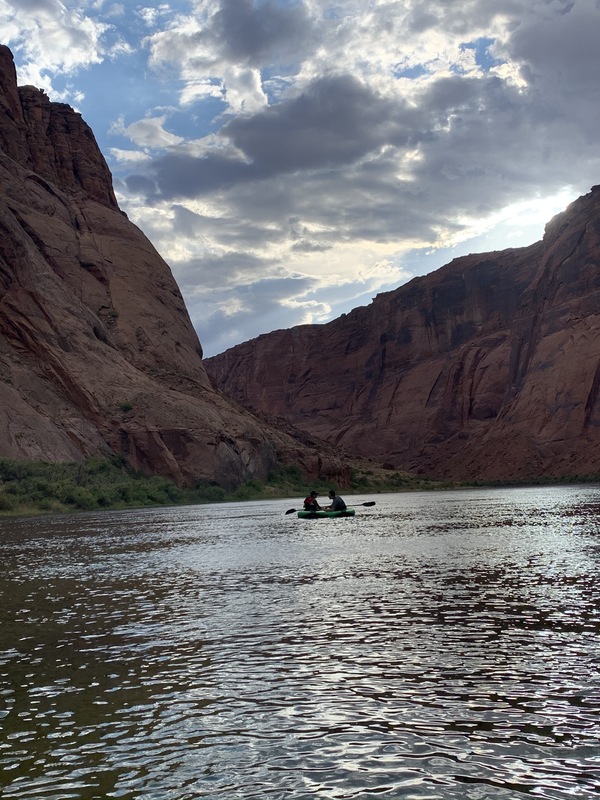 2020-07-22
2020-07-22Grand Canyon Adventure
With the lockdown measures in place this summer, my friends and I found ourselves hiking and exploring much of Arizona in an effort to escape the indoors for a while. As a native Arizonan I have never had the pleasure of experiencing the Grand Canyon first-hand, but this summer, I was able to explore one of the world's most beautiful natural landscapes. Truly an adventure, we camped on Horseshoe Bend and kayaked down the Colorado River (in which I unfortunately dropped my phone). As busy students who had scattered across the world for college, we were able to reconnect and remind ourselves of what is truly important in the midst of this pandemic: family, friends, health, and the natural beauty of the one world that we all share. -
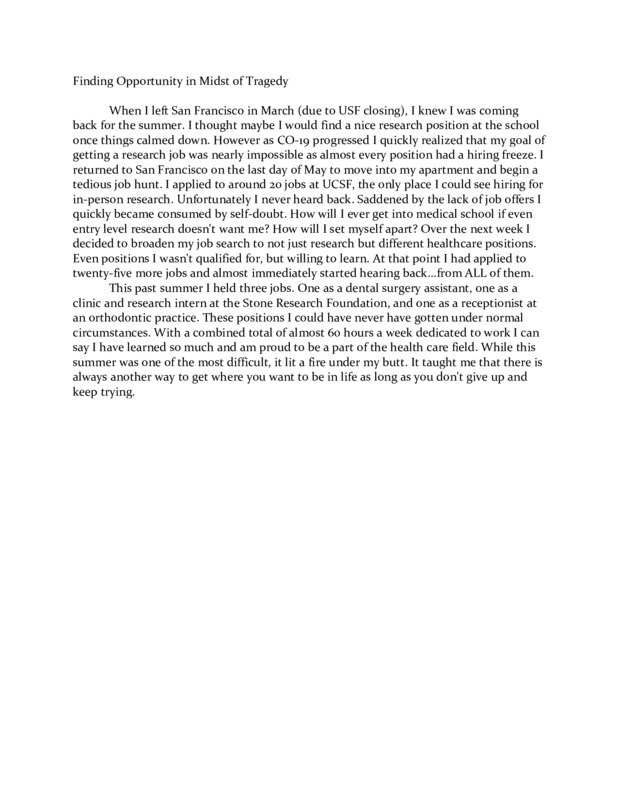 2020-06-09
2020-06-09Finding Opportunity in Midst of Tragedy
When I left San Francisco in March (due to USF closing), I knew I was coming back for the summer. I thought maybe I would find a nice research position at the school once things calmed down. However as CO-19 progressed I quickly realized that my goal of getting a research job was nearly impossible as almost every position had a hiring freeze. I returned to San Francisco on the last day of May to move into my apartment and begin a tedious job hunt. I applied to around 20 jobs at UCSF, the only place I could see hiring for in-person research. Unfortunately I never heard back. Saddened by the lack of job offers I quickly became consumed by self-doubt. How will I ever get into medical school if even entry level research doesn't want me? How will I set myself apart? Over the next week I decided to broaden my job search to not just research but different healthcare positions. Even positions I wasn't qualified for, but willing to learn. At that point I had applied to twenty-five more jobs and almost immediately started hearing back...from ALL of them. This past summer I held three jobs. One as a dental surgery assistant, one as a clinic and research intern at the Stone Research Foundation, and one as a receptionist at an orthodontic practice. These positions I could have never have gotten under normal circumstances. With a combined total of almost 60 hours a week dedicated to work I can say I have learned so much and am proud to be a part of the health care field. While this summer was one of the most difficult, it lit a fire under my butt. It taught me that there is always another way to get where you want to be in life as long as you don't give up and keep trying. -
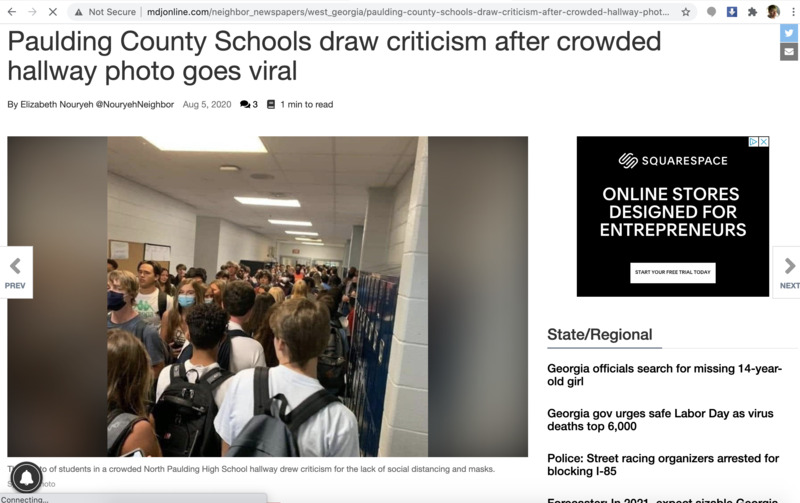 2020-08-04
2020-08-04Blind Recklessness
This photo really captures how reckless state governments were in the pandemic, opening schools despite it not being safe. Captured here is the danger of having schools open during a pandemic. -
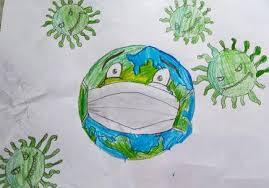 2007-08-30
2007-08-30Wear a Mask Including You Earth
I think this picture can be up for interpretation but I see it as all of Earth needs to wear a mask and be together in the fight for Covid because it comes for everyone. Simply put, we need to have a universal plan to fight this together. This is a drawing I found on the hindu.com -
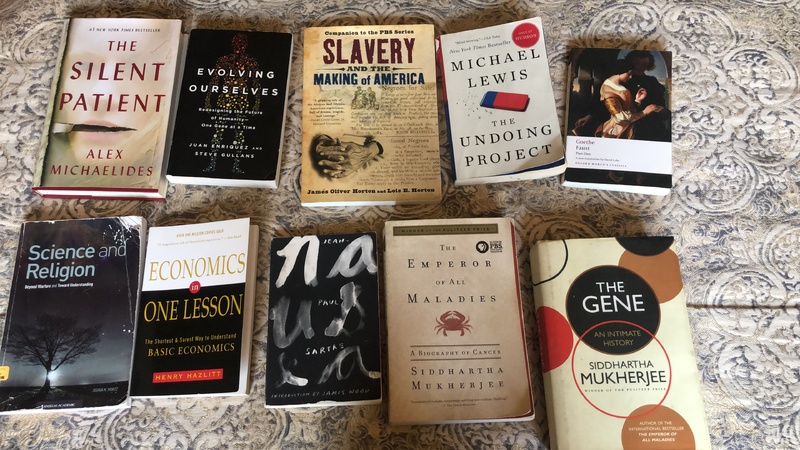 2020-09-01
2020-09-01The learning never stops
Ever since I got my own laptop, I stopped reading books. It had been almost 5 years since I started reading again. The reason for picking up a book was the boredom that came along with the lockdown and being alone for a little more than a month. Once I started with the first it was really hard to stop. It is a skill I am glad to have regained as it excites a part of mind that movies or videos never do. The vast amounts of information that is carried in a single book just makes the day better for me. It has been months since the lockdown started and the thirst for knowledge has not stopped. -
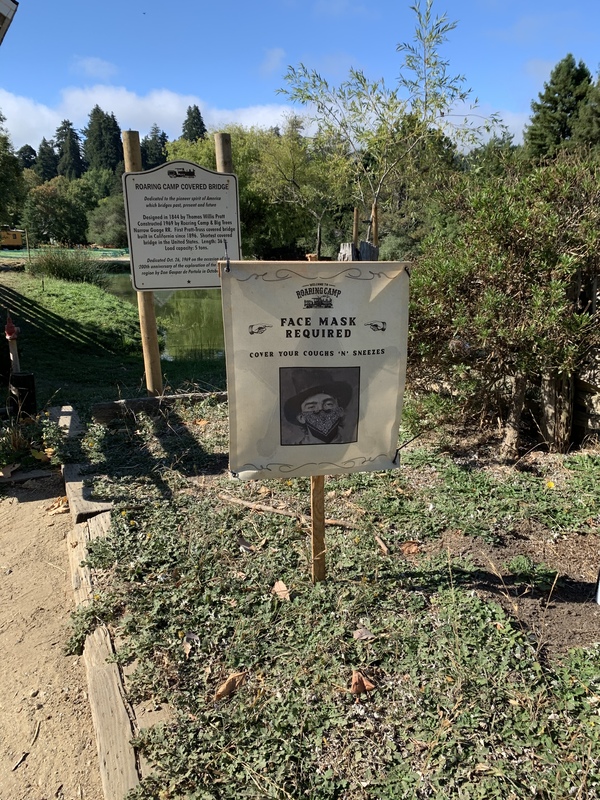 2020-04-19
2020-04-19Signs in California
The current pandemic has created visual devices that highlight: the growing severity of COVID, and the community's collective responsibility and attitude towards keeping everyone safe. These signs allow individuals to reflect that they aren't alone, and that they, being a part of the community, are both directly and indirectly accountable for keeping others safe. These signs encourage those to think about the community at large and inspire those that have waning spirits, to remain strong. Photographs taken in San Francisco's Inner Sunset and at Cowell Redwoods State Park -
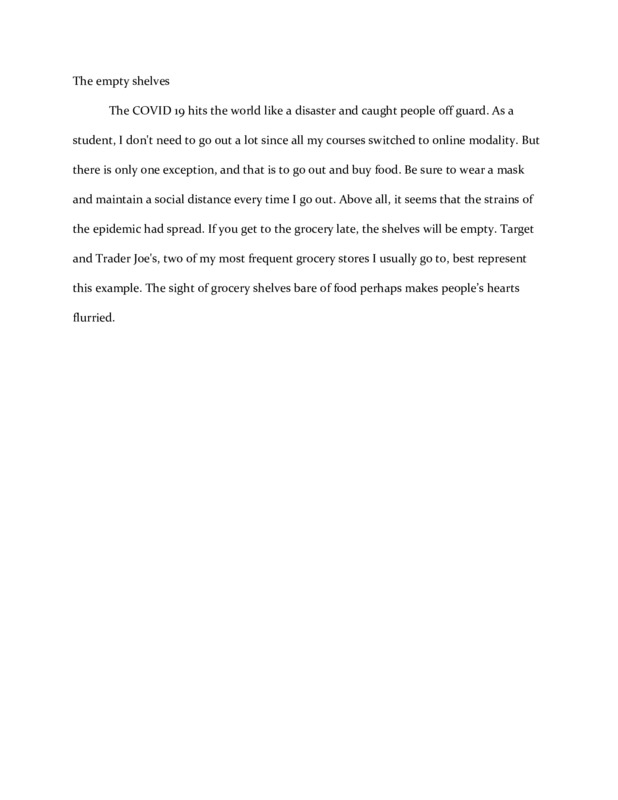 2020-04-10
2020-04-10The empty shelves
The COVID 19 hits the world like a disaster and caught people off guard. As a student, I don't need to go out a lot since all my courses switched to online modality. But there is only one exception, and that is to go out and buy food. Be sure to wear a mask and maintain a social distance every time I go out. Above all, it seems that the strains of the epidemic had spread. If you get to the grocery late, the shelves will be empty. Target and Trader Joe's, two of my most frequent grocery stores I usually go to, best represent this example. The sight of grocery shelves bare of food perhaps makes people’s hearts flurried. -
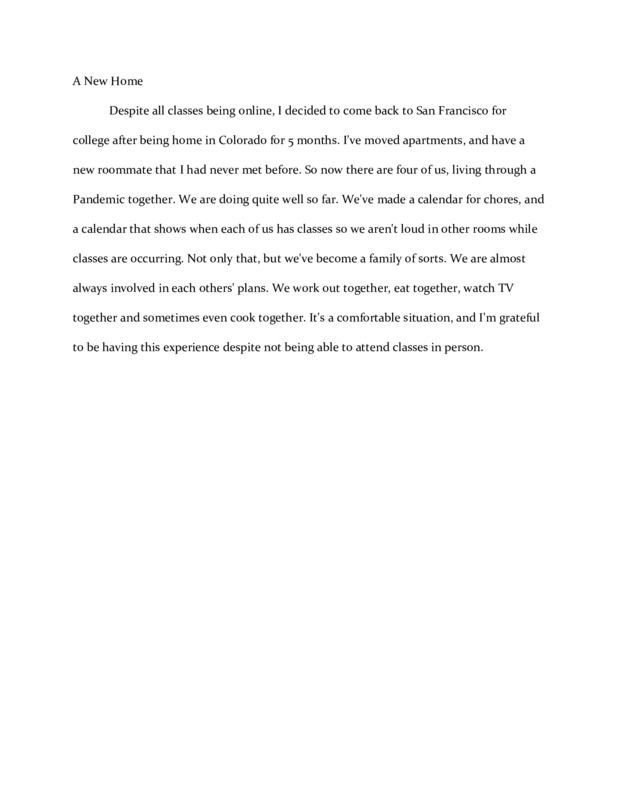 2020-08-30
2020-08-30A New Home
Despite all classes being online, I decided to come back to San Francisco for college after being home in Colorado for 5 months. I've moved apartments, and have a new roommate that I had never met before. So now there are four of us, living through a Pandemic together. We are doing quite well so far. We've made a calendar for chores, and a calendar that shows when each of us has classes so we aren't loud in other rooms while classes are occurring. Not only that, but we've become a family of sorts. We are almost always involved in each others' plans. We work out together, eat together, watch TV together and sometimes even cook together. It's a comfortable situation, and I'm grateful to be having this experience despite not being able to attend classes in person. -
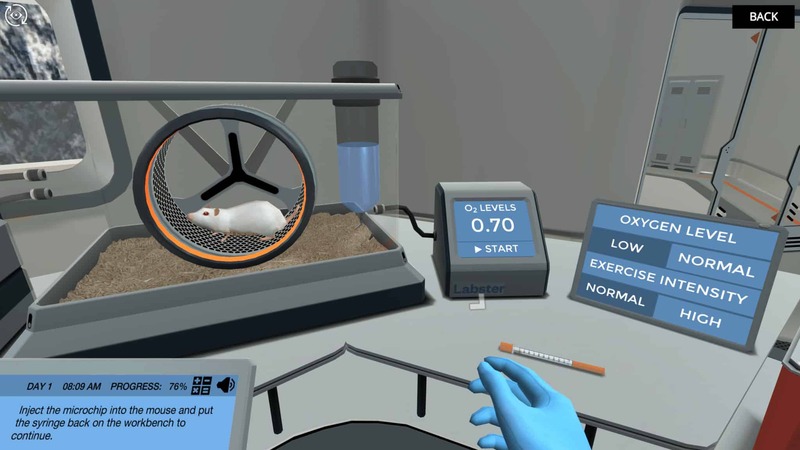 2020-08-30
2020-08-30Virtual labs feel like a bad video game
I'm currently adjusting to virtual lab for an upper-division physiology course, and my class is using a program called Labster for simulations. Picture a 2010's era, first-person video game where you are walked through 'levels' of the lab by a floating robot overlord called Dr. One. You get to put on a virtual lab coat, use a virtual iPad, and interact with virtual lab equipment. I've done experiments on computerized lab-rats, teleported into mitochondria, and clicked my way through the Krebs cycle. It feels very dystopian and unsettling, and would be funny if I wasn't being charged full tuition for what boils down to a Portal-2 knock-off without the cool aliens. Sometimes it's nice not having to commute to school. But mostly, I miss real lab and the feeling that I'm learning something meaningful by being in class. -
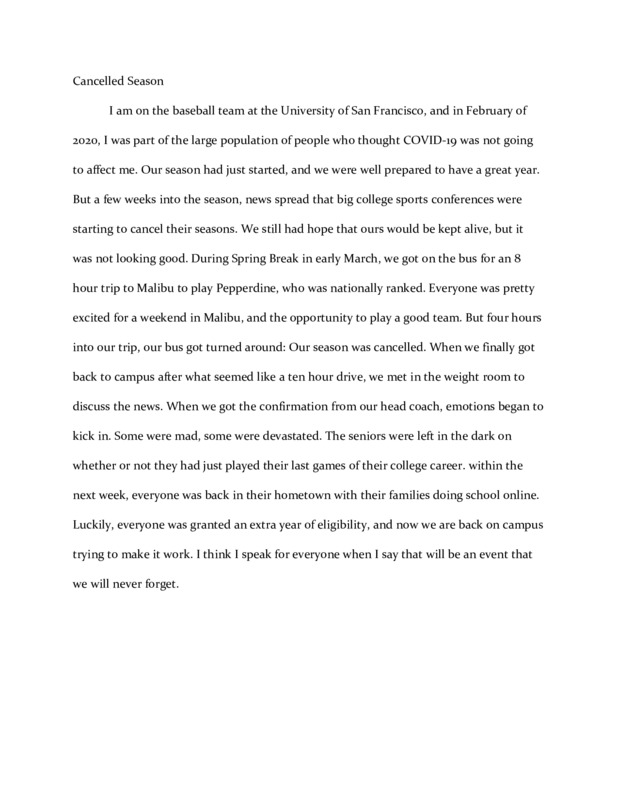 2020-03-08
2020-03-08Cancelled Season
I am on the baseball team at the University of San Francisco, and in February of 2020, I was part of the large population of people who thought COVID-19 was not going to affect me. Our season had just started, and we were well prepared to have a great year. But a few weeks into the season, news spread that big college sports conferences were starting to cancel their seasons. We still had hope that ours would be kept alive, but it was not looking good. During Spring Break in early March, we got on the bus for an 8 hour trip to Malibu to play Pepperdine, who was nationally ranked. Everyone was pretty excited for a weekend in Malibu, and the opportunity to play a good team. But four hours into our trip, our bus got turned around: Our season was cancelled. When we finally got back to campus after what seemed like a ten hour drive, we met in the weight room to discuss the news. When we got the confirmation from our head coach, emotions began to kick in. Some were mad, some were devastated. The seniors were left in the dark on whether or not they had just played their last games of their college career. within the next week, everyone was back in their hometown with their families doing school online. Luckily, everyone was granted an extra year of eligibility, and now we are back on campus trying to make it work. I think I speak for everyone when I say that will be an event that we will never forget. -
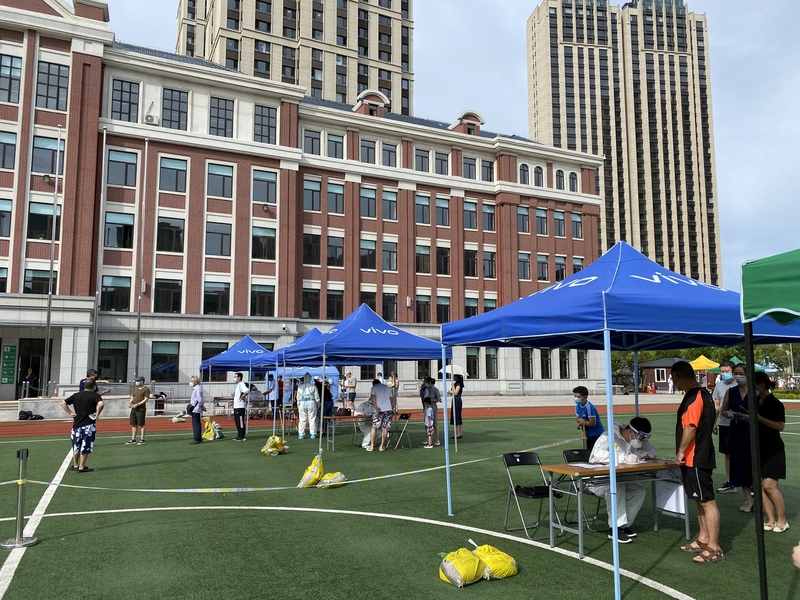 2020-07-26
2020-07-26COVID-19 test
On July 22th, 2020 Dalian, China detected one comfirmed coronavirus patient who did not have travel history, he was infected from his factory which imported seafood. The next day the city started to do the free coronavirus test street by street to find out how many people were in close contact with the first patient were infected and placed them in hospital for quarantine and treatment. This was a picture taken when I was lining up for the covid-19 test. It touched me that doctors and volunteers from nationwide gathered immediately and risking their health to help and protect us. -
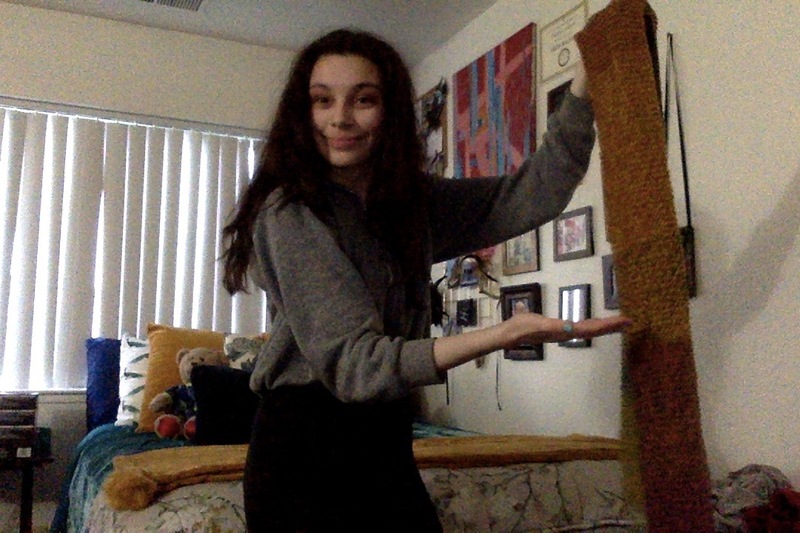 2020-08-24
2020-08-24How I've Been Occupying My Time to Not Occupy Spaces
Like most people, I have discovered an interest in hobbies that I never really had the time to indulge in prior to the pandemic. I was living in San Francisco, beginning the end of my college years and looking forward to what the future held for me and my beautiful, and not at all expensive, B.A. in philosophy that I was to receive in December 2020. Most of my friends were graduating in the Spring and I was so envious... that was until the pandemic hit. Everything moved so quickly. I had only 3 days to move out of my apartment, say good-bye the the people closest to me, and leave the city I've had the privilege of living in for the last three years. A city where I've scattered memories all over the place, danced through the streets with kindred spirits I hadn't met before, and developed a fierce love for my first home as an independent young woman. All stripped away from the palms of my hands, and in a matter of days it was the end of an era. It was the beginning of a global pandemic, something barely anybody had experienced before. The world seemed to only inhibit negativity and death, a cocktail very few people could take, and that's including a chaser. Sadness filled the air and polluted social media platforms. We all felt uncertain, scared, and alone. These feelings crept up, and leeched onto us. But one thing was absolutely certain, I had all the time in the world. There I was, 22 with no job and nowhere to go. There was nowhere I could go. So I did what any ordinary person would do in this situation, and I taught myself how to function the way humans did before social media and the internet. I learned to do some of the things that were once taught to young women in school with the intention of making them a qualified wife, but I called them hobbies. I learned to knit, embroider, sew by hand and by sewing machine, thoroughly clean a bathroom, and I also mastered the art of Mediterranean cooking. In the photo I have a attached I am showing off a scarf that I made in the first couple of weeks in quarantine. I playfully boasted my finished craft to my philosophy of nature class, and we all had a laugh. I miss that group of people. I do, however, find some happiness in being able to take a step back and slow down. The only reason I was able to do so was because I didn't have a choice in the matter. The world was crashing down right before my eyes and I couldn't do anything to stop it aside from staying home and staying away from others. What I think this narrative has to say about the pandemic is that people actually have the capacity to entertain themselves outside of the internet. Growing up I was always using the internet. I went from selecting my Top 8 on MySpace to watching prank videos on youtube to having class virtually. I have become sick of screen time that I have no choice but to pick something up to stay interested in the ordinary day to day. I've developed skills that could help me out in the future, if I could be so brave to assume there is a future of course. It is important for me to find some light, to find some joy. I giggled before this global pandemic, I've giggled during, and I will giggle after. Heck, I giggled while writing this personal narrative called an assignment. I have to giggle, it keeps me young and alive. It is important to find some light in all the darkness, and I think that's one of the most important things I've truly learned through all of this: To be the light you so desperately want to see. I've called that scarf my quarantine sqarf, and I can't wait to wear it for the rest of my time and then gift it to someone I love one day when I am old and saggy, if I am so lucky to get there. Stay safe and wash your hands. -
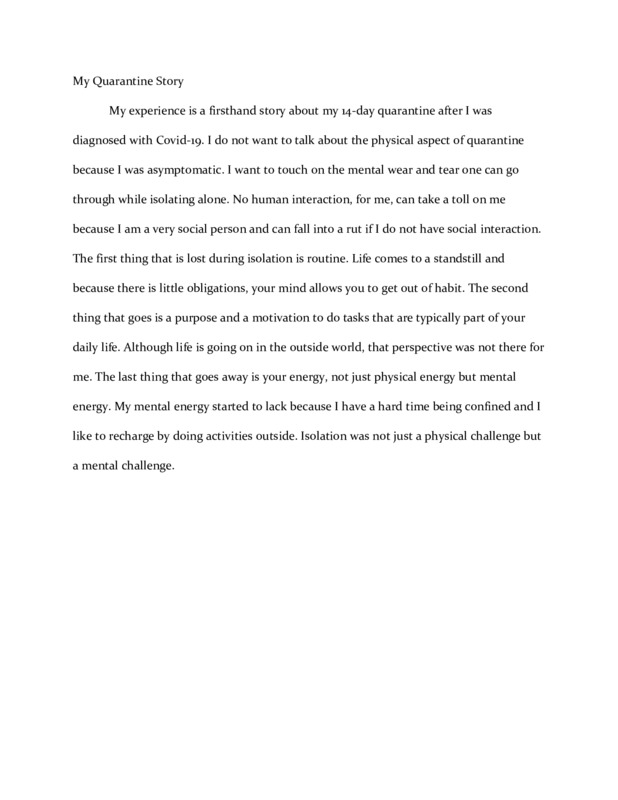 2020-07-07
2020-07-07My Quarantine Story
My experience is a firsthand story about my 14-day quarantine after I was diagnosed with Covid-19. I do not want to talk about the physical aspect of quarantine because I was asymptomatic. I want to touch on the mental wear and tear one can go through while isolating alone. No human interaction, for me, can take a toll on me because I am a very social person and can fall into a rut if I do not have social interaction. The first thing that is lost during isolation is routine. Life comes to a standstill and because there is little obligations, your mind allows you to get out of habit. The second thing that goes is a purpose and a motivation to do tasks that are typically part of your daily life. Although life is going on in the outside world, that perspective was not there for me. The last thing that goes away is your energy, not just physical energy but mental energy. My mental energy started to lack because I have a hard time being confined and I like to recharge by doing activities outside. Isolation was not just a physical challenge but a mental challenge. -
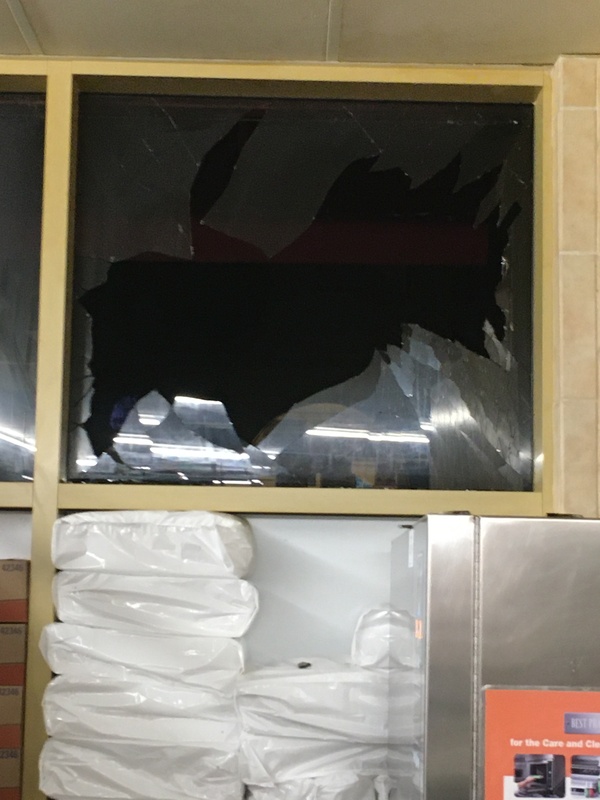 2020-06-01
2020-06-01Anger, Uncertainty, and Fear Felt Nationwide: Reverberations in San Francisco
These photos portray the heightened social and political tensions that occurred after George Floyd's death. Systematic racism, marginalization, and police brutality sparked an increase in civil unrest, resulting in a mandated curfew in San Francisco. Floyd's tragic death caused rioting, protesting, and looting nationwide, concurrently taking place during the worsening pandemic of COVID-19. As many businesses closed their doors, many closing for good, few essential businesses such as Safeway stayed open. Strict policies in regards to wearing faces masks, social distancing as well as more intensive cleaning measures, were enforced to ensure the safety of the community at large. In short, the photos of store policies depict the rapid changes that were implemented in response to COVID-19. The rest of the photos show how our store took cover during the intense rioting that spiked in late May and early June. A few depict the aftermath of the looting at a local Safeway branch; the store that I worked at was not unscathed in the looting scene. I hid with a couple of employees in the manager's office, on the phone with police, as people broke in. This is just a small glimpse into a larger event that reverberated nationwide, sparking massive outcry, and hushed voices to rise as many sheltered during this pandemic. -
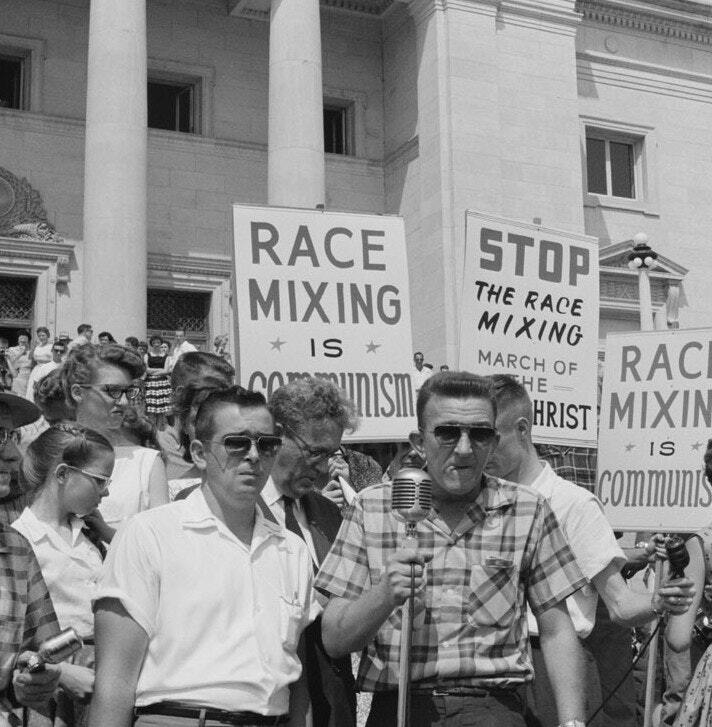 2020-04
2020-04Old Paranoia
The modern day photo, the one quivocating social distancing to Communism, I first stumbled upon on social media. The photo instantly made me think how paranoia has always played a part in the American attitude towards the government; Americans have always been quick to assume that the government isn't being straightforward with them and that there's a conspiracy afoot. That conclusion leads me to the second photo, taken in August of 1959 in Little Rock, Arkanasas, was the response to school integration that allowed African-Americans to go to formerly White-Only schools. As you can see, it's a mirror image of Americans forming conspiracy theories or general paranoia that is usually scapegoated onto Communism. -
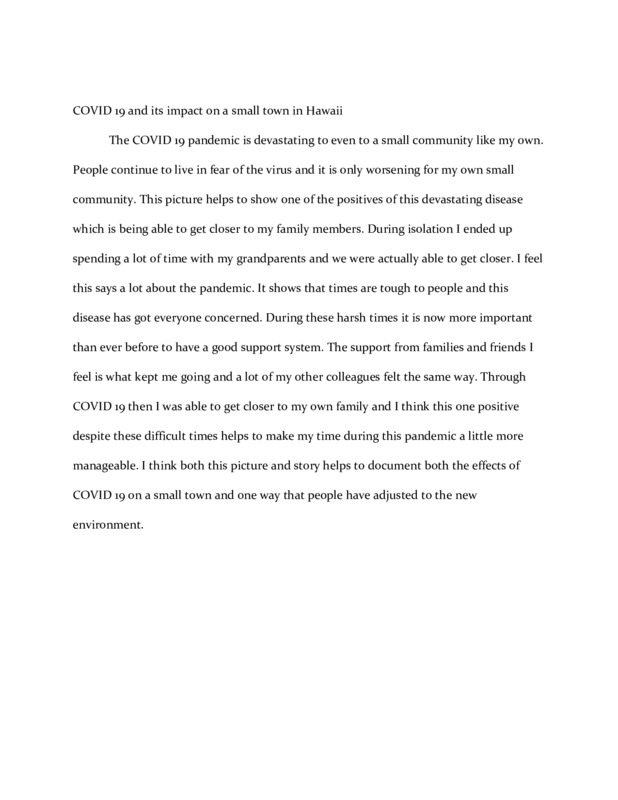 2020-08-22
2020-08-22COVID 19 and its impact on a small town in Hawaii
The COVID 19 pandemic is devastating to even to a small community like my own. People continue to live in fear of the virus and it is only worsening for my own small community. This picture helps to show one of the positives of this devastating disease which is being able to get closer to my family members. During isolation I ended up spending a lot of time with my grandparents and we were actually able to get closer. I feel this says a lot about the pandemic. It shows that times are tough to people and this disease has got everyone concerned. During these harsh times it is now more important than ever before to have a good support system. The support from families and friends I feel is what kept me going and a lot of my other colleagues felt the same way. Through COVID 19 then I was able to get closer to my own family and I think this one positive despite these difficult times helps to make my time during this pandemic a little more manageable. I think both this picture and story helps to document both the effects of COVID 19 on a small town and one way that people have adjusted to the new environment. -
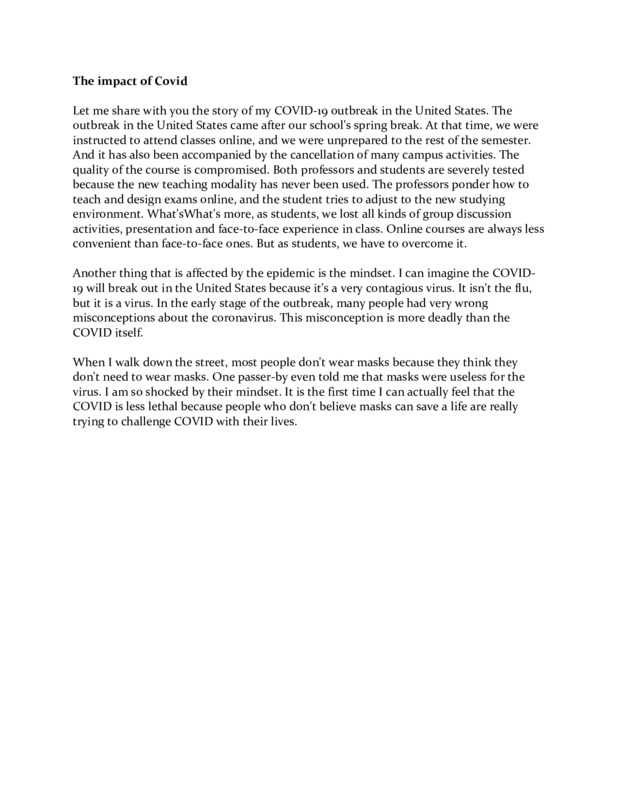 2020-03-30
2020-03-30The impact of Covid
Let me share with you the story of my COVID-19 outbreak in the United States. The outbreak in the United States came after our school's spring break. At that time, we were instructed to attend classes online, and we were unprepared to the rest of the semester. And it has also been accompanied by the cancellation of many campus activities. The quality of the course is compromised. Both professors and students are severely tested because the new teaching modality has never been used. The professors ponder how to teach and design exams online, and the student tries to adjust to the new studying environment. What'sWhat's more, as students, we lost all kinds of group discussion activities, presentation and face-to-face experience in class. Online courses are always less convenient than face-to-face ones. But as students, we have to overcome it. Another thing that is affected by the epidemic is the mindset. I can imagine the COVID-19 will break out in the United States because it's a very contagious virus. It isn't the flu, but it is a virus. In the early stage of the outbreak, many people had very wrong misconceptions about the coronavirus. This misconception is more deadly than the COVID itself. When I walk down the street, most people don't wear masks because they think they don't need to wear masks. One passer-by even told me that masks were useless for the virus. I am so shocked by their mindset. It is the first time I can actually feel that the COVID is less lethal because people who don't believe masks can save a life are really trying to challenge COVID with their lives. -
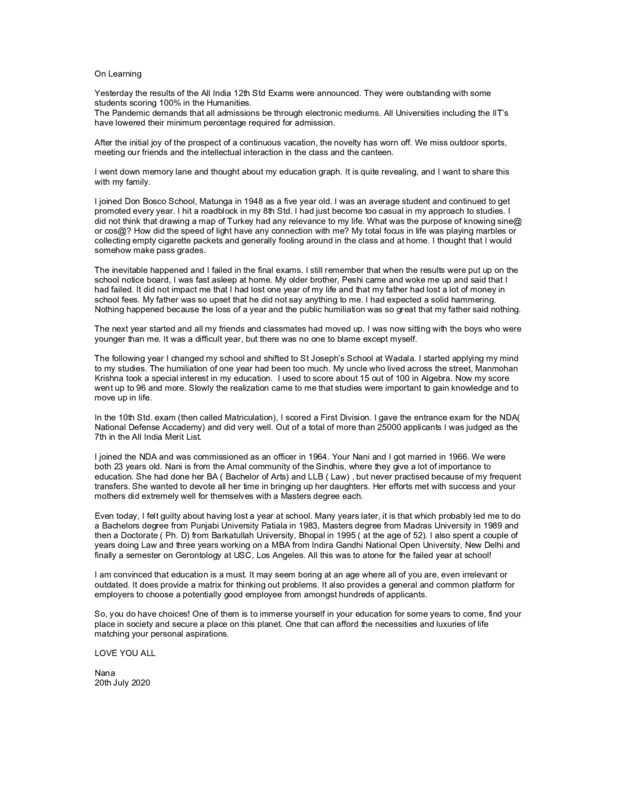 2020-07-20
2020-07-20On Learning: Importance and prevalence of education
It is my last year of undergraduate studies and a really crucial year for the transition into Medical School. Experiencing such a thing as this pandemic at such a momentous period in my life was intimidating at first but gradually transitioned into a much required reflection. The lockdown had started at the end of the Spring semester and the importance of school and studies started to fade away into what seemed like a never-ending holiday. The semester then ended and summer seemed like an extension of the holiday even though entrance exams were just around the corner for Medical School. Two months went by in a flash and nothing but a lazy attitude was accomplished. I then recieved this letter in an email from my grandfather who was half-way accross the world. The letter was a short story about his life and the educational aspects of it. He was clearly reliving some of his memories from when he was my age and wanted to impart some much needed advice onto me. Without knowing my mental state at that point, he knew exactly what I needed and could somehow sense my cowardice. His letter gave me a "kick in the butt", which was much required. From the letter; arose in me a certain kind of motivation that had escaped since the start of the lockdown. The letter is a small example highlighting the privilege of an education. It exemplifies the importance of learning, which can be useful for every student. The yearning to learn must never stop, especially at a time such as this. -
 2020-08-24
2020-08-24health code
It is the health code that is required for every Chinese citizens to enter public buildings and use public transportations. It proves that you have not encountered any one who has been tested positive nor did you traveled to a high-risk area in the last 14 days; you would only be allowed to go into the public if the health code is green. It has become a daily essential for me, like face masks and hand sanitizes. -
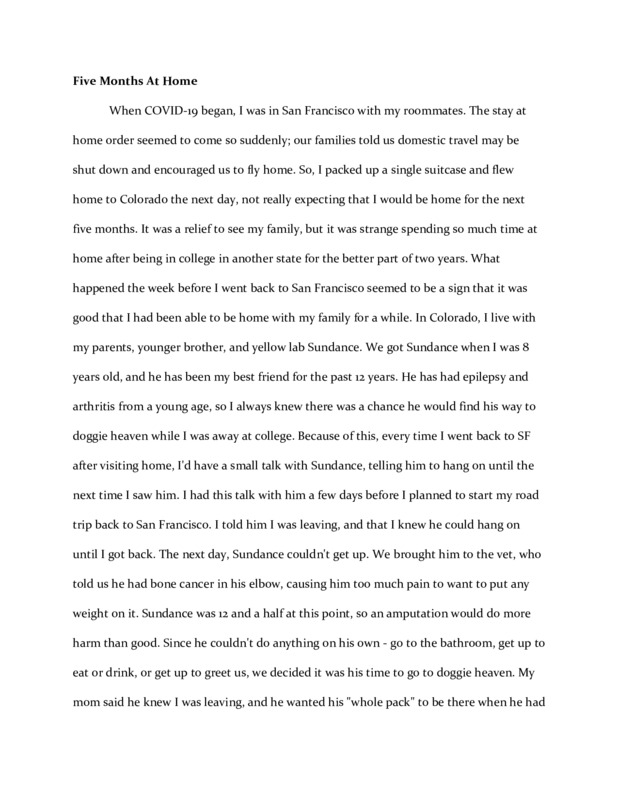 0020-08-23
0020-08-23Five Months At Home
When COVID-19 began, I was in San Francisco with my roommates. The stay at home order seemed to come so suddenly; our families told us domestic travel may be shut down and encouraged us to fly home. So, I packed up a single suitcase and flew home to Colorado the next day, not really expecting that I would be home for the next five months. It was a relief to see my family, but it was strange spending so much time at home after being in college in another state for the better part of two years. What happened the week before I went back to San Francisco seemed to be a sign that it was good that I had been able to be home with my family for a while. In Colorado, I live with my parents, younger brother, and yellow lab Sundance. We got Sundance when I was 8 years old, and he has been my best friend for the past 12 years. He has had epilepsy and arthritis from a young age, so I always knew there was a chance he would find his way to doggie heaven while I was away at college. Because of this, every time I went back to SF after visiting home, I'd have a small talk with Sundance, telling him to hang on until the next time I saw him. I had this talk with him a few days before I planned to start my road trip back to San Francisco. I told him I was leaving, and that I knew he could hang on until I got back. The next day, Sundance couldn't get up. We brought him to the vet, who told us he had bone cancer in his elbow, causing him too much pain to want to put any weight on it. Sundance was 12 and a half at this point, so an amputation would do more harm than good. Since he couldn't do anything on his own - go to the bathroom, get up to eat or drink, or get up to greet us, we decided it was his time to go to doggie heaven. My mom said he knew I was leaving, and he wanted his "whole pack" to be there when he had to move on. It's always too soon to say goodbye to your best friend, but I think that this was true. After all, he did wait until I was back home again to say goodbye. Quarantine has been hard, but it gave me time with my family and my dog that I will forever cherish. -
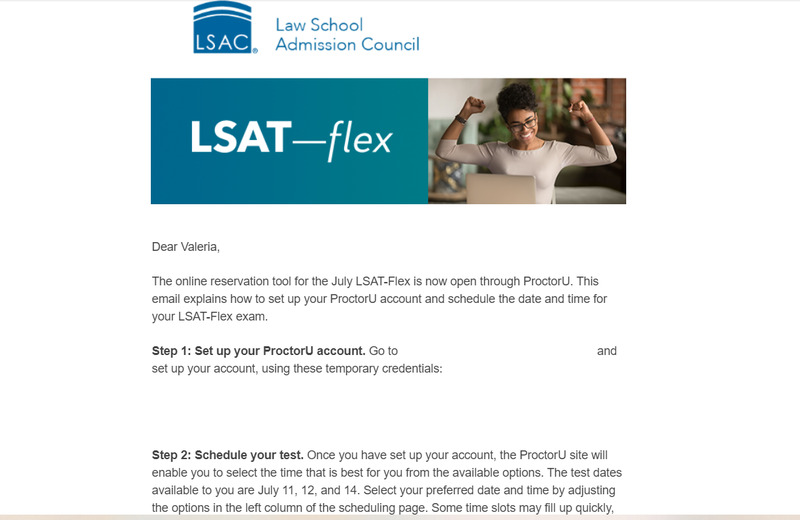 2020-07
2020-07Online Testing
As a prospective law school applicant, I took the LSAT (Law School Admission Test) this past July in an online proctored format. Far from what I expected for such an important career-altering test, taking it in my bedroom in a household with five other family members was definitely unprecedented. The comfort of home allowed for me to be less nervous, but required me to think about the test will scared that any noise made by my family would result in a disqualification of my test. Overall, I’m grateful to still have had the opportunity to take it, although definitely under very different circumstances. -
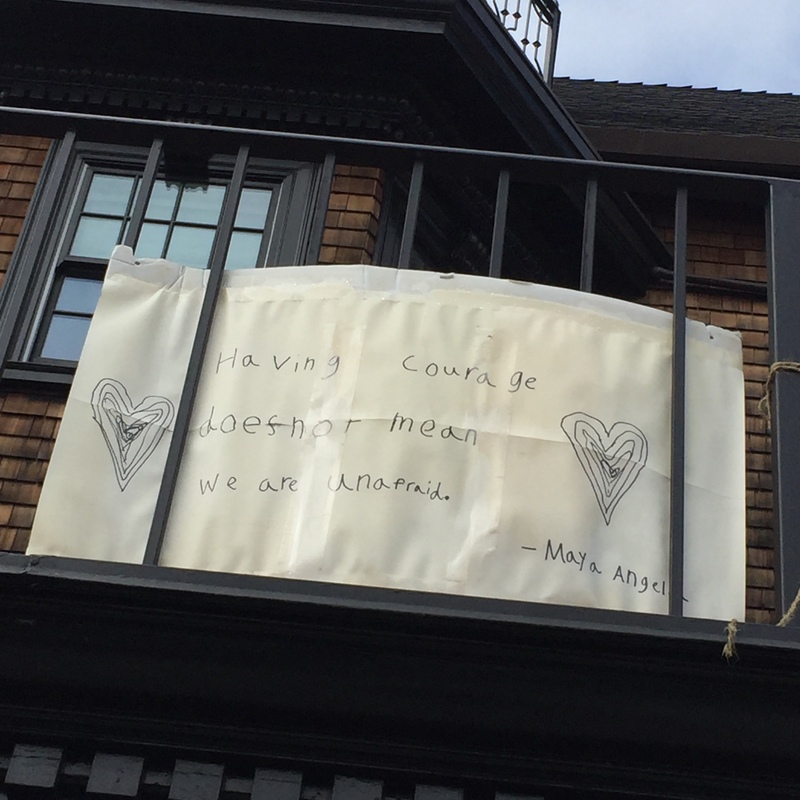 2020-03-29
2020-03-29sign of courage
Early in the pandemic, when we were sheltering in place but were allowed to be outside for exercise (here in San Francisco), I started taking photographs of signs people posted in and around their homes. This became a daily activity while I was out for a walk. Usually the signs were fairly small and were posted in windows. But sometimes they were more elaborate, like this one with a quote about the nature of courage from Maya Angelou. It made me realize that courage isn't the absence of fear; it's something else. The longer quote includes this: "Having courage and showing courage means we face our fears." That has really helped me in this frightening time. -
2020-08-20
Portland Protests During COVID-19
The videos that I am sharing are from the Portland Protests. I feel compelled to share them because protests at this scale are unprecedented in their diversity, longevity, and turnout, and may represent a social tipping-point precipitated by the dual economic and health crises imposed by COVID-19. Before COVID-19, I had planned to spend Spring Break visiting friends in Portland, Oregon. Midway through the break, my university moved classes online and I had the opportunity to stay in Portland for 5 months. On May 25th, the murder of George Floyd by Minneapolis police sparked national protests against systemic racism and police brutality. The Portland protests were especially large and active, which garnered significant media coverage and led to deployment of federal agents to the city. In the midst of a pandemic, when so many healthcare workers found themselves without adequate PPE, police departments across the country were armed with seemingly limitless munitions and riot gear. Tear gas, pepper spray, sonic weaponry, batons, and riot shields were used against demonstrators, whose defenses were composed of homemade shields, leaf blowers, traffic cones, and water bottles. Yet he crowd still showed up at the Justice Center every night, and many are still there after nearly 4 months. These protests are unprecedented, and have caused many Americans to adopt radical stances against racist and unaccountable policing, and we would be remiss not to document them as part of the Plague Year. -
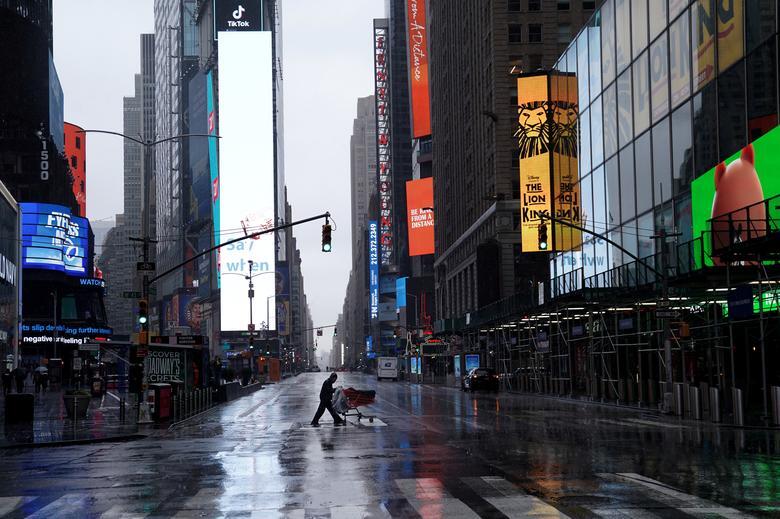 2020-08-23
2020-08-23NYC Ghost Town
When people think of NYC, they think of how crowded and busy it is. To walk down the streets of NY, especially Times Square, and see nothing short of a ghost town, is a scary site. It almost reminds me of something out of a movie, more specifically the movie “I Am Legend.” Who knows the next time you’ll ever see an empty street in NYC like this again. -
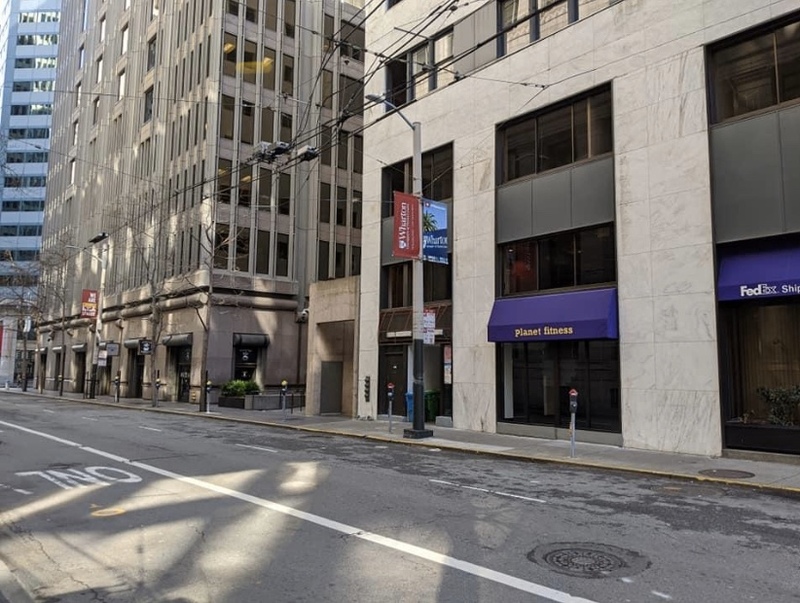 2020-03-17
2020-03-17The Big Flee
Early in the morning on March 17, my roommates and I fled San Francisco. It felt extremely weird leaving my life behind, but we would return to normal soon (or so I thought). As we piled our belongings into the back of a friend's car I looked around to see nobody. Not even an early morning jogger or any sign of life for that matter. In the airport we got through security in five minutes and saw around two others our whole time there. It was as if time had stood still in the city. At the time I was extremely scared, as what evils could cause a city-wide shutdown? How dangerous was CO-19 if all colleges had moved to online learning and forced every student out of the dorms? Little was known about the effects of CO-19 in March, and as I write this on August 23, 2020 more is yet to be discovered before we can safely reopen as a country. I chose to include this photo with my story as it was taken on March 16, 2020, the night before San Francisco's mandatory shutdown. It was eerie how silent the once bustling streets of downtown were. I had never witnessed something like this in my life.
